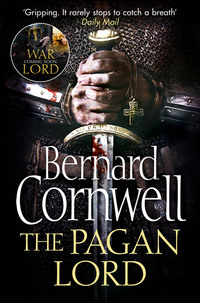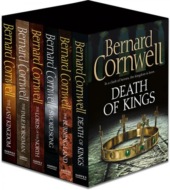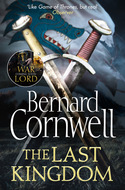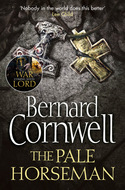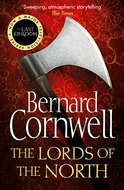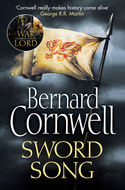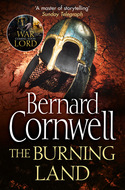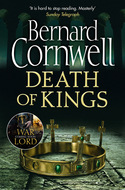Das Buch kann nicht als Datei heruntergeladen werden, kann aber in unserer App oder online auf der Website gelesen werden.
Buch lesen: "The Pagan Lord"
THE PAGAN LORD

BERNARD CORNWELL

Copyright
HarperCollinsPublishers
1 London Bridge Street
London SE1 9GF
First published in Great Britain by HarperCollinsPublishers 2013
Copyright © Bernard Cornwell 2013
Maps © John Gilkes 2013
Family tree © Colin Hall 2009
Cover layout design © HarperCollinsPublishers Ltd 2016
Cover illustration © Lee Gibbons/Tin Moon www.leegibbons.co.uk.
Bernard Cornwell asserts the moral right to be identified as the author of this work.
A catalogue record for this book is available from the British Library.
This novel is entirely a work of fiction. The names, characters and incidents portrayed in it, while at times based on historical figures, are the work of the author’s imagination.
All rights reserved under International and Pan-American Copyright Conventions. By payment of the required fees, you have been granted the non-exclusive, non-transferable right to access and read the text of this e-book on-screen. No part of this text may be reproduced, transmitted, down-loaded, decompiled, reverse engineered, or stored in or introduced into any information storage and retrieval system, in any form or by any means, whether electronic or mechanical, now known or hereinafter invented, without the express written permission of HarperCollins.
Source ISBN: 9780007331925
Ebook Edition © 2014 ISBN: 9780007331949
Version: 2019-09-27
Dedication
THE PAGAN LORD
is for Tom and Dana
Go raibh mile maith agat
CONTENTS
Cover
Title Page
Copyright
Dedication
Place Names
Map
The Royal Family of Wessex
Part One: THE ABBOT
Chapter One
Chapter Two
Part Two: MIDDELNIHT
Chapter Three
Chapter Four
Chapter Five
Part Three: RUMOURS OF WAR
Chapter Six
Chapter Seven
Chapter Eight
Chapter Nine
Chapter Ten
Part Four: ICE-SPITE
Chapter Eleven
Chapter Twelve
Chapter Thirteen
Historical Note
Keep Reading …
About the Author
Also by Bernard Cornwell
About the Publisher
PLACE NAMES
The spelling of place names in Anglo-Saxon England was an uncertain business, with no consistency and no agreement even about the name itself. Thus London was variously rendered as Lundonia, Lundenberg, Lundenne, Lundene, Lundenwic, Lundenceaster and Lundres. Doubtless some readers will prefer other versions of the names listed below, but I have usually employed whichever spelling is cited in either the Oxford or the Cambridge Dictionary of English Place-Names for the years nearest to AD 900, but even that solution is not foolproof. Hayling Island, in 956, was written as both Heilincigae and Hæglingaiggæ. Nor have I been consistent myself; I should spell England as Englaland, and have preferred the modern form Northumbria to Norðhymbralond to avoid the suggestion that the boundaries of the ancient kingdom coincide with those of the modern county. So this list, like the spellings themselves, is capricious.
| Æsc’s Hill | Ashdown, Berkshire |
| Afen | River Avon, Wiltshire |
| Beamfleot | Benfleet, Essex |
| Bearddan Igge | Bardney, Lincolnshire |
| Bebbanburg | Bamburgh Castle, Northumberland |
| Bedehal | Beadnell, Northumberland |
| Beorgford | Burford, Oxfordshire |
| Botulfstan | Boston, Lincolnshire |
| Buchestanes | Buxton, Derbyshire |
| Ceaster | Chester, Cheshire |
| Ceodre | Cheddar, Somerset |
| Cesterfelda | Chesterfield, Derbyshire |
| Cirrenceastre | Cirencester, Gloucestershire |
| Coddeswold Hills | The Cotswolds, Gloucestershire |
| Cornwalum | Cornwall |
| Cumbraland | Cumbria |
| Dunholm | Durham, County Durham |
| Dyflin | Dublin, Eire |
| Eoferwic | York, Yorkshire |
| Ethandun | Edington, Wiltshire |
| Exanceaster | Exeter, Devon |
| Fagranforda | Fairford, Gloucestershire |
| Farnea Islands | Farne Islands, Northumberland |
| Flaneburg | Flamborough, Yorkshire |
| Foirthe | River Forth, Scotland |
| The Gewæsc | The Wash |
| Gleawecestre | Gloucester, Gloucestershire |
| Grimesbi | Grimsby, Lincolnshire |
| Haithabu | Hedeby, Denmark |
| Humbre | River Humber |
| Liccelfeld | Lichfield, Staffordshire |
| Lindcolne | Lincoln, Lincolnshire |
| Lindisfarena | Lindisfarne (Holy Island), Northumberland |
| Lundene | London |
| Mærse | River Mersey |
| Pencric | Penkridge, Staffordshire |
| Sæfern | River Severn |
| Sceapig | Isle of Sheppey, Kent |
| Snotengaham | Nottingham, Nottinghamshire |
| Tameworþig | Tamworth, Staffordshire |
| Temes | River Thames |
| Teotanheale | Tettenhall, West Midlands |
| Tofeceaster | Towcester, Northamptonshire |
| Uisc | River Exe |
| Wiltunscir | Wiltshire |
| Wintanceaster | Winchester, Hampshire |
| Wodnesfeld | Wednesbury, West Midlands |

The Royal Family of Wessex

PART ONE
The Abbot

One
A dark sky.
The gods make the sky; it reflects their moods and they were dark that day. It was high summer and a bitter rain was spitting from the east. It felt like winter.
I was mounted on Lightning, my best horse. He was a stallion, black as night, but with a slash of grey pelt running down his hindquarters. He was named for a great hound I had once sacrificed to Thor. I hated killing that dog, but the gods are hard on us; they demand sacrifice and then ignore us. This Lightning was a huge beast, powerful and sullen, a warhorse, and I was in my war-glory on that dark day. I was dressed in mail and clad in steel and leather. Serpent-Breath, best of swords, hung at my left side, though for the enemy I faced that day I needed no sword, no shield, no axe. But I wore her anyway because Serpent-Breath was my companion. I still own her. When I die, and that must be soon, someone will close my fingers around the leather-bindings of her worn hilt and she will carry me to Valhalla, to the corpse-hall of the high gods, and we shall feast there.
But not that day.
That dark summer day I sat in the saddle in the middle of a muddy street, facing the enemy. I could hear them, but could not see them. They knew I was there.
The street was just wide enough for two wagons to pass each other. The houses either side were mud and wattle, thatched with reeds that had blackened with rain and grown thick with lichen. The mud in the street was fetlock deep, rutted by carts and fouled by dogs and by the swine that roamed free. The spiteful wind rippled the puddles in the ruts and whipped smoke from a roof-hole, bringing the scent of burning wood.
I had two companions. I had ridden from Lundene with twenty-two men, but my mission in this shit-smelling, rain-spitted village was private and so I had left most of my men a mile away. Yet Osbert, my youngest son, was behind me, mounted on a grey stallion. He was nineteen years old, he wore a suit of mail and had a sword at his side. He was a man now, though I thought of him as a boy. I frightened him, just as my father had frightened me. Some mothers soften their sons, but Osbert was motherless and I had raised him hard because a man must be hard. The world is filled with enemies. The Christians tell us to love our enemies and to turn the other cheek. The Christians are fools.
Next to Osbert was Æthelstan, bastard eldest son of King Edward of Wessex. He was just eight years old, yet like Osbert he wore mail. Æthelstan was not frightened of me. I tried to frighten him, but he just looked at me with his cold blue eyes, then grinned. I loved that boy, just as I loved Osbert.
Both were Christians. I fight a losing battle. In a world of death, betrayal and misery, the Christians win. The old gods are still worshipped, of course, but they’re being driven back into the high valleys, into the lost places, to the cold northern edges of the world, and the Christians spread like a plague. Their nailed god is powerful. I accept that. I have always known their god has great power and I don’t understand why my gods let the bastard win, but they do. He cheats. That’s the only explanation I can find. The nailed god lies and cheats, and liars and cheaters always win.
So I waited in the wet street, and Lightning scraped a heavy hoof in a puddle. Above my leather and mail I wore a cloak of dark blue wool, edged with stoat fur. The hammer of Thor hung at my throat, while on my head was my wolf-crested helmet. The cheek-pieces were open. Rain dripped from the helmet rim. I wore long leather boots, their tops stuffed with rags to keep the rain from trickling down inside. I wore gauntlets, and on my arms were the rings of gold and rings of silver, the rings a warlord earns by killing his enemies. I was in my glory, though the enemy I faced did not deserve that respect.
‘Father,’ Osbert began, ‘what if …’
‘Did I speak to you?’
‘No.’
‘Then be quiet,’ I snarled.
I had not meant to sound so angry, but I was angry. It was an anger that had no place to go, just anger at the world, at the miserable dull grey world, an impotent anger. The enemy was behind closed doors and they were singing. I could hear their voices, though I could not distinguish their words. They had seen me, I was certain, and they had seen that the street was otherwise empty. The folk who lived in this town wanted no part of what was about to happen.
Though what was about to happen I did not know myself, even though I would cause it. Or perhaps the doors would stay shut and the enemy would cower inside their stout timber building? Doubtless that was the question Osbert had wanted to ask. What if the enemy stayed indoors? He probably would not have called them the enemy. He would have asked what if ‘they’ stay indoors.
‘If they stay indoors,’ I said, ‘I’ll beat their damned door down, go in and pull the bastard out. And if I do that then the two of you will stay here to hold Lightning.’
‘Yes, Father.’
‘I’ll come with you,’ Æthelstan said.
‘You’ll do as you’re damned well told.’
‘Yes, Lord Uhtred,’ he said respectfully, but I knew he was grinning. I did not need to turn around to see that insolent grin, but I would not have turned because at that moment the singing stopped. I waited. A moment passed and then the doors opened.
And out they came. Half a dozen older men first, then the young ones, and I saw those younger ones look at me, but even the sight of Uhtred, warlord draped in anger and glory, could not stifle their joy. They looked so happy. They were smiling, slapping each other’s backs, embracing and laughing.
The six older men were not laughing. They walked towards me and I did not move. ‘I am told you are Lord Uhtred,’ one of them said. He wore a grubby white robe belted with rope, was white-haired and grey-bearded and had a narrow, sun-darkened face with deep lines carved round his mouth and eyes. His hair fell past his shoulders, while his beard reached to his waist. He had a sly face, I thought, but not without authority, and he had to be a churchman of some importance because he carried a heavy staff topped with an ornate silver cross.
I said nothing to him. I was watching the younger men. They were boys mostly, or boys just turned to men. Their scalps, where their hair had been shaved back from their foreheads, gleamed pale in the grey daylight. Some older folk were coming from the doors now. I assumed they were the parents of these boy-men.
‘Lord Uhtred.’ The man spoke again.
‘I’ll speak to you when I’m ready to speak,’ I growled.
‘This is not seemly,’ he said, holding the cross towards me as if it might frighten me.
‘Clean your rancid mouth out with goat piss,’ I said. I had seen the young man I had come to find and I kicked Lightning forward. Two of the older men tried to stop me, but Lightning snapped with his big teeth and they staggered back, desperate to escape. Spear-Danes had fled from Lightning, and the six older men scattered like chaff.
I drove the stallion into the press of younger men, leaned down from the saddle and grasped the man-child’s black gown. I hauled him upwards, thrust him belly-down over the pommel and turned Lightning with my knees.
And that was when the trouble started.
Two or three of the younger men tried to stop me. One reached for Lightning’s bridle and that was a mistake, a bad mistake. The teeth snapped, the boy-man screamed, and I let Lightning rear up and flail with his front hooves. I heard the crash of one heavy hoof into bone, saw blood bright and sudden. Lightning, trained to keep moving lest an enemy try to hamstring a back leg, lurched forward. I spurred him, glimpsing a fallen man with a bloody skull. Another fool grasped my right boot, trying to haul me from the saddle, and I slammed my hand down and felt the grip vanish. Then the man with long white hair challenged me. He had followed me into the crowd and he shouted that I was to let my captive go, and then, like a fool, he swung the heavy silver cross on its long shaft at Lightning’s head. But Lightning had been trained to battle and he twisted lithely, and I leaned down and seized the staff and ripped it from the man’s grasp. Still he did not give up. He was spitting curses at me as he seized Lightning’s bridle and tried to drag the horse back into the crowd of youths, presumably so I would be overwhelmed by numbers.
I raised the staff and slammed it down hard. I used the butt end of the staff as if it were a spear, and did not see it was tipped with a metal spike, presumably so the cross could be rammed into the earth. I had just meant to stun the ranting fool, but instead the staff buried itself in his head. It pierced his skull. It brightened that dull gloomy day with blood. It caused screams to sound to the Christian heaven, and I let the staff go and the white-robed man, now dressed in a robe dappled with red, stood swaying, mouth opening and closing, eyes glazing, with a Christian cross jutting skywards from his head. His long white hair turned red, and then he fell. He just fell, dead as a bone. ‘The abbot!’ someone shouted, and I spurred Lightning and he leaped forward, scattering the last of the boy-men and leaving their mothers screaming. The man draped over my saddle struggled and I hit him hard on the back of his skull as we burst from the press of people back into the open street.
The man on my saddle was my son. My eldest son. He was Uhtred, son of Uhtred, and I had ridden from Lundene too late to stop him becoming a priest. A wandering preacher, one of those long-haired, wild-bearded, mad-eyed priests who gull the stupid into giving them silver in return for a blessing, had told me of my son’s decision. ‘All Christendom rejoices,’ he had said, watching me slyly.
‘Rejoices in what?’ I had asked.
‘That your son is to be a priest! Two days from now, I hear, in Tofeceaster.’
And that was what the Christians had been doing in their church, consecrating their wizards by making boys into black-clothed priests who would spread their filth further, and my son, my eldest son, was now a damned Christian priest and I hit him again. ‘You bastard,’ I growled, ‘you lily-livered bastard. You traitorous little cretin.’
‘Father …’ he began.
‘I’m not your father,’ I snarled. I had taken Uhtred down the street to where a particularly malodorous dung-heap lay wetly against a hovel wall. I tossed him into it. ‘You are not my son, I said, ‘and your name is not Uhtred.’
‘Father …’
‘You want Serpent-Breath down your throat?’ I shouted. ‘If you want to be my son you take off that damned black frock, put on mail and do what I tell you.’
‘I serve God.’
‘Then choose your own damned name. You are not Uhtred Uhtredson.’ I twisted in the saddle. ‘Osbert!’
My younger son kicked his stallion towards me. He looked nervous. ‘Father?’
‘From this day on your name is Uhtred.’
He glanced at his brother, then back to me. He nodded reluctantly.
‘What is your name?’ I demanded.
He still hesitated, but saw my anger and nodded again. ‘My name is Uhtred, Father.’
‘You are Uhtred Uhtredson,’ I said, ‘my only son.’
It had happened to me once, long ago. I had been named Osbert by my father, who was called Uhtred, but when my elder brother, also Uhtred, was slaughtered by the Danes my father had renamed me. It is always thus in our family. The eldest son carries on the name. My stepmother, a foolish woman, even had me baptised a second time because, she said, the angels who guard the gates of heaven would not know me by my new name, and so I was dipped in the water barrel, but Christianity washed off me, thank Christ, and I discovered the old gods and have worshipped them ever since.
The five older priests caught up with me. I knew two of them, the twins Ceolnoth and Ceolberht who, some thirty years before, had been hostages with me in Mercia. We had been boys captured by the Danes, a fate I had welcomed and the twins had hated. They were old now, two identical priests with stocky builds, greying beards and anger livid on their round faces. ‘You’ve killed the Abbot Wihtred!’ one of the twins challenged me. He was furious, shocked, almost incoherent with rage. I had no idea which twin he was because I could never tell them apart.
‘And Father Burgred’s face is ruined!’ the other twin said. He moved as if to take Lightning’s bridle and I turned the horse fast, letting him threaten the twins with the big yellow teeth that had bitten off the newly ordained priest’s face. The twins stepped back.
‘The Abbot Wihtred!’ the first twin repeated the name. ‘A saintlier man never lived!’
‘He attacked me,’ I said. In truth I had not meant to kill the old man, but there was small point in telling that to the twins.
‘You’ll suffer!’ one of the twins yelped. ‘You will be cursed for all time!’
The other held a hand towards the wretched boy in the dung-heap. ‘Father Uhtred,’ he said.
‘His name is not Uhtred,’ I snarled, ‘and if he dares call himself Uhtred,’ I looked at him as I spoke, ‘then I will find him and I will cut his belly to the bone and I will feed his lily-livered guts to my swine. He is not my son. He’s not worthy to be my son.’
The man who was not worthy to be my son clambered wetly from the dung-heap, dripping filth. He looked up at me. ‘Then what am I called?’ he asked.
‘Judas,’ I said mockingly. I was raised as a Christian and had been forced to hear all their stories, and I recalled that a man named Judas had betrayed the nailed god. That never made any sense to me. The god had to be nailed to a cross if he was to become their saviour, and then the Christians blame the man who made that death possible. I thought they should worship him as a saint, but instead they revile him as a betrayer. ‘Judas,’ I said again, pleased I had remembered the name.
The boy who had been my son hesitated, then nodded. ‘From now on,’ he said to the twins, ‘I am to be called Father Judas.’
‘You cannot call yourself …’ either Ceolnoth or Ceolberht began.
‘I am Father Judas,’ he said harshly.
‘You will be Father Uhtred!’ one of the twins shouted at him, then pointed at me. ‘He has no authority here! He is a pagan, an outcast, loathed of God!’ He was shaking with anger, hardly able to speak, but he took a deep breath, closed his eyes and raised both hands towards that dark sky. ‘O God,’ he shouted, ‘bring down your wrath on this sinner! Punish him! Blight his crops and strike him with sickness! Show your power, O Lord!’ His voice rose to a shriek. ‘In the name of the Father, and of the Son and of the Holy Spirit, I curse this man and all his kin.’
He took a breath and I pressed my knee on Lightning’s flank and the great horse moved a pace closer to the ranting fool. I was as angry as the twins.
‘Curse him, O Lord,’ he shouted, ‘and in thy great mercy bring him low! Curse him and his kin, may they never know grace! Smite him, O Lord, with filth and pain and misery!’
‘Father!’ the man who had been my son shouted.
Æthelstan chuckled. Uhtred, my only son, gasped.
Because I had kicked the ranting fool. I had pulled my right foot from the stirrup and lashed out with the heavy boot and his words stopped abruptly, replaced by blood on his lips. He staggered backwards, his right hand pawing at his shattered mouth. ‘Spit out your teeth,’ I ordered him, and when he disobeyed I half drew Serpent-Breath.
He spat out a mix of blood, spittle and broken teeth. ‘Which one are you?’ I asked the other twin.
He gaped at me, then recovered his wits. ‘Ceolnoth,’ he said.
‘At least I can tell the two of you apart now,’ I said.
I did not look at Father Judas. I just rode away.
I rode home.
Perhaps Ceolberht’s curse had worked, because I came home to death, smoke and ruin.
Cnut Ranulfson had raided my hall. He had burned it. He had killed. He had taken Sigunn captive.
None of it made sense, not then. My estate was close to Cirrenceastre, which was deep inside Mercia. A band of horse-Danes had ridden far, risking battle and capture, to attack my hall. I could understand that. A victory over Uhtred would give a man reputation, it would spur the poets to taunting songs of victory, but they had attacked while the hall was almost empty. They would surely have sent scouts? They would have suborned folk to be spies for them, to discover when I was there and when I was likely to be absent, and such spies would surely have told them that I had been summoned to Lundene to advise King Edward’s men on that city’s defences. Yet they had risked disaster to attack an almost empty hall? It made no sense.
And they had taken Sigunn.
She was my woman. Not my wife. Since Gisela died I had not taken another wife, though I had lovers in those days. Æthelflaed was my lover, but Æthelflaed was another man’s wife and the daughter of the dead King Alfred, and we could not live together as man and wife. Sigunn lived with me instead, and Æthelflaed knew it. ‘If it wasn’t Sigunn,’ she had told me one day, ‘it would be another.’
‘Maybe a dozen others.’
‘Maybe.’
I had captured Sigunn at Beamfleot. She was a Dane, a slender, pale, pretty Dane who had been weeping for her slaughtered husband when she was dragged out of a sea-ditch running with blood. We had lived together almost ten years now and she was treated with honour and hung with gold. She was the lady of my hall and now she was gone. She had been taken by Cnut Ranulfson, Cnut Longsword.
‘It was three mornings ago,’ Osferth told me. He was the bastard son of King Alfred, who had tried to turn him into a priest, but Osferth, even though he had the face and mind of a cleric, preferred to be a warrior. He was careful, precise, intelligent, reliable and rarely impassioned. He resembled his father, and the older he got the more like his father he looked.
‘So it was Sunday morning,’ I said bleakly.
‘Everyone was in the church, lord,’ Osferth explained.
‘Except Sigunn.’
‘Who is no Christian, lord,’ he said, sounding disapproving.
Finan, who was my companion and the man who commanded my troops if I was absent, had taken twenty men to reinforce Æthelflaed’s bodyguard as she toured Mercia. She had been inspecting the burhs that guarded Mercia from the Danes, and doubtless worshipping in churches across the land. Her husband, Æthelred, was reluctant to leave the sanctuary of Gleawecestre and so Æthelflaed did his duty. She had her own warriors who guarded her, but I still feared for her safety, not from the Mercians, who loved her, but from her husband’s followers, and so I had insisted she take Finan and twenty men and, in the Irishman’s absence, Osferth had been in charge of the men guarding Fagranforda. He had left six men to watch over the hall, barns, stables and mill, and six men should have been more than enough because my estate lay a long way from the northern lands where the Danes ruled. ‘I blame myself, lord,’ Osferth said.
‘Six was enough,’ I said. And the six were all dead, as was Herric, my crippled steward, and three other servants. Some forty or fifty horses were gone, while the hall was burned. Some of the walls still stood, gaunt scorched trunks, but the hall’s centre was just a heap of smoking ash. The Danes had arrived fast, broken down the hall door, slaughtered Herric and anyone else who tried to oppose them, then had taken Sigunn and left. ‘They knew you’d all be in the church,’ I said.
‘Which is why they came on Sunday,’ Sihtric, another of my men, finished the thought.
‘And they would have known you wouldn’t be worshipping,’ Osferth said.
‘How many were there?’ I asked Osferth.
‘Forty or fifty,’ he replied patiently. I had asked him the question a dozen times already.
Danes do not make a raid like this for pleasure. There were plenty of Saxon halls and steadings within easy reach of their lands, but these men had risked riding deep into Mercia. For Sigunn? She was nothing to them.
‘They came to kill you, lord,’ Osferth suggested.
Yet the Danes would have scouted the land first, they would have talked to travellers, they would know that I always had at least twenty men with me. I had chosen not to take those twenty into Tofeceaster to punish the man who had been my son because a warrior does not need twenty men to deal with a pack of priests. My son and a boy had been company enough. But the Danes could not have known I was at Tofeceaster, even I had not known I was going there till I heard the news that my damned son was becoming a Christian wizard. Yet Cnut Ranulfson had risked his men in a long, pointless raid, despite the danger of meeting my men. He would have outnumbered me, but he would have taken casualties that he could ill afford, and Cnut Longsword was a calculating man, not given to idiotic risks. None of it made sense. ‘You’re sure it was Cnut Ranulfson?’ I asked Osferth.
‘They carried his banner, lord.’
‘The axe and broken cross?’
